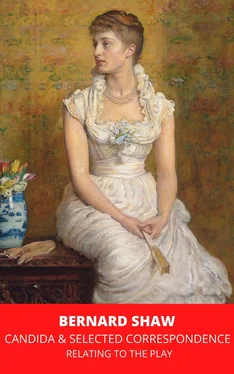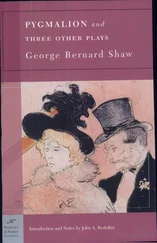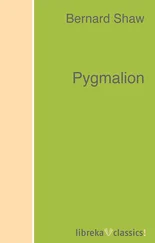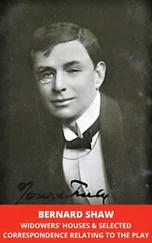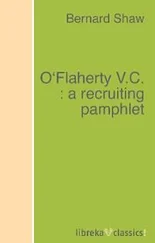By this mail I write to Miss [Elisabeth] Marbury, my agent (Empire Theatre Building, 40th St. and Broadway), instructing her to get the script and parts of Candida, and the script of The Philanderer from Mansfield, if he has not changed his mind by the time my letter arrives. I have further instructed her to give the parts to you, and to send me back the script. You will therefore have the set of parts as well as a prompt copy in your possession, in case of need. But as I still think Candida a valuable chance for you, I will not let you throw away the first performance of it except on a thoroughly serious occasion. C. C. [Charles Charrington] starts tonight for Liverpool to join the Cunarder which sails tomorrow. He insists on going as an emigrant; and as there seems to me to be something in his contention that he will be too seasick to care where or how he travels—oh, here he is; and he is not going after all: your cablegram has stopped him. . . .
GBS
17/ Bernard Shaw’s interview with Lady Colin Campbell née Gertrude Elizabeth Blood published by her newspaper Realm “ Candida : a Talk with Mr Bernard Shaw ”
5th April 1895
Now, Mr Shaw, as himself avers, writes plays more by accident than design. An idea occurs to him on a bus; and presently the idea has—quite fortuitously—spread itself into a play. It was about the latest accident— Candida —that we were talking—and about its author.
‘I am the most conventional of men,’ sighed Mr Shaw, somewhat regretfully.
‘And yet,’ I suggested, ‘there is an impression abroad that any work of yours is likely to be unconventional.’
‘Has it ever occurred to you,’ said Mr Shaw, ‘that the conventional play has never been written?’
‘I suppose the conventional reply would be that the conventional play is “all over the stage”.’
‘Not at all. The play “all over the stage” is the play in which the convention is violated. It is not the convention, but the violation of it, which is the subject of the play. That is what the playwright and the public wallow in. The convention is really only an assumption that what the characters are doing is extremely wrong. It is never explained or argued for a moment why it’s wrong, or what the conventional position really is. The author assumes it, the public assumes it, all for the sake of a bit of tragedy—and there you are. Now, it occurred to me that, as the really conventional play remained to be written, I was just the sort of man to write it.’
It was a hard saying. I pleaded for more light.
‘In Candida ,’ explained Mr Shaw, ‘the convention is the subject of the play.’
‘What convention?’
‘I beg your pardon—the wife-and-mother convention. The strongest and best position a woman can occupy, you know, is that of a wife and a mother.’
‘Then, you accept the convention as valid?’
‘Of course, there is a truth in that, as in every other convention. Not that every woman is in her right place as a wife and a mother. Some women in that predicament are in a hopelessly wrong position. They are married to the wrong man; they have no genius for motherhood; there are a thousand and one ways in which they may be out of their plane. But my heroine happens to be precisely in the right position. That, you perceive, is an absolutely original and yet a completely conventional situation for a heroine.’
‘But do you find it a thrillingly dramatic one?’
‘That’s a home question, in more senses than one. And a question that must be answered by the public. For myself, I have found it, as a dramatist, a sufficiently dramatic situation. I have found in it a motive which completely satisfies my dramatic sense.’
‘And what of the plot? Does the heroine never get out of this original and conventional situation?’
‘If I told you the plot, you would think it the dullest affair you had ever heard. There is a clergyman and his wife—who is Candida, the heroine.’
‘Who is the villain of the piece?’
‘I never deal in villainy. The nearest thing I have got to it is a minor poet, who falls in love with the heroine.’
‘Ah! And then what happens?’
‘Some conversations. That’s all.’
‘Absolutely nothing more than that?’
‘No more than that. But such conversations!’
‘Doesn’t the heroine even run away with the minor poet—or—or anything?’
‘No—nothing. She stays at home with her husband. Rather a good idea—isn’t it?’
‘Yes—conventional in real life, and novel on the stage. Really, I suppose lots of wives stay with their husbands. Only, it’s a point that the modern drama has missed.’
Thereupon it struck me that I might clear up a matter which has been bothering people a good deal for the last few years. There is no category for Mr Bernard Shaw. We like to be able to stick a label on a man, put him in a pigeon-hole, and be certain of always finding him there.
‘Some time ago,’ I said, ‘I remember asking you what you were—a musical critic, a dramatic critic, a demagogue, a dramatist? Independent candidates stand a poor chance for Walhalla [a hall of fame that honours laudable and distinguished people in German history]. On which ticket are you going for election?’
‘I am all of them by turns,’ replied Mr Shaw. ‘Not long ago I was a musical critic, as you know. But when I began to write plays I recognised the necessity of getting into a position to slate other people’s plays. So I became a dramatic critic. Beyond that, nothing is changed. I am still a leader of the democracy, which still persists in taking no notice whatever of my teachings.’
‘Now,—speaking for a moment as a dramatic critic—what do you consider the chief faults of Mr G. Bernard Shaw, the playwright?’
Mr Shaw took counsel with his beard.
‘It is very difficult to say,’ he said at length,—‘very difficult indeed. Speaking from my own point of view, of course I start miles ahead of anyone else, and keep there. But from the point of view of the public—well, perhaps, one of my faults is that I do not preach enough: I am not sufficiently didactic. The public want a dramatist to tell them ten minutes beforehand what he is going to do, then to do it, and then, ten minutes afterwards, to tell them what is the right moral to draw from it. The public,’ continued Mr Shaw, leaning forward confidentially, ‘want to be bored, and I am never a bore. That is one of my greatest failings. For the public are quite uncomfortable when they look for the moral in (say) Arms and the Man and can’t find one.’
‘Except, perhaps, that a true story seldom has any moral. Have you any other failings?’
‘The only other is a kindred one. It comes from my lack of experience in writing for the stage. When I get a good idea I have not had sufficient practice to work it for all it is worth and exhaust it. I have to run away from it, as it were, and take refuge in being brilliant and sparkling. With experience comes dulness. When I have written enough plays to grow dull I shall succeed. But at present I have only been a dramatist to amuse myself.’
‘And a demagogue to amuse other people?’
‘Exactly.’
18/ Richard Mansfield to an American dramatic critic and author William Winter
10th April 1895
. . . I have discarded play after play, and I am in despair. I cannot present—I cannot act, the sickening rot the playwright of today turns out. Shaw’s Candida was sweet and clean—but he’s evidently got a religious turn—an awakening to Christianity; and it’s just two and one-half hours of preaching, and I fear the people don’t want that. Also, there is no part for me but a sickly youth, a poet who falls in love with Candida—who is a young lady of thirty-five and the wife of an honest clergyman, who is a socialist! There is no change of scene in three acts, and no action beyond moving from a chair to a sofa, and vice versa. O, ye Gods and little fishes! . . .
Читать дальше
